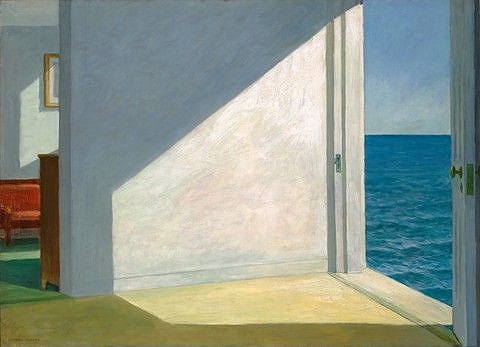Hinges&Doors

Edward Hopper: Rooms by the Sea (1951)
" … blind man coping as the pinnacle of engaging."
Our Grand Refurbish has depended upon many contributions. Our workers, who serve more as artisans, and whom we have fairly compensated, still contributed their non-refundable time to help us realize our fuzzy intentions. They gave away their care and attention. Reassembling the place after transformation depends upon tiny things, most prominently, Hinges&Doors. The doors, dedicated readers will recall, filled my playbook during the early to middle Refurbishment periods. I scraped and sanded each face before repainting it. They seemed finished works of art then, merely needing hanging, until hanging proved to be the most difficult part of the operation, with no merely in it. Hinges, you see, complicate everything. Hanging a door on its hinges becomes a two-man operation, with a third hand handy, involving grunting, hammering, and cursing. A few doors slip right onto their anchors, but most require a little adjustment, a little manual reasoning before they'll fit. Once mounted, the door might not quite sit squarely within its frame and require further hinge adjustment or a little frenzied sanding or planing along its top or leading edges. It seems wondrous when any of them work. I hold lingering doubts that all of them ever will. ©2021 by David A. Schmaltz - all rights reserved
One disassembles and one takes chances that something might not so seamlessly reassemble again. No playbook exists. I tried to remember all the tiny details when taking apart, but the parts went on for stripping and scraping and lost their individualities in that process. I produced a pile of semi-generic parts. Who knew their origin? Further, I purchased showy solid brass hinges for the more prominent doors, and those fine hinges came with tiny yet significant differences. A sixteenth of an inch out of alignment might just as well be an inch out given that both differences require considerable effort to resolve. It's three-dimensional chess, too, with mysterious relationships between space and time. I can pinch a hinge knuckle in or out but the effect will be less predictable than if I was backing up a trailer. Everything's backward and sideways and N-Dimensional. Hanging doors on hinges utterly depends upon trial and error, with unusually heavy reliance upon the error part of that equation. Even setting a strike plate might necessitate twenty adjustments, each a repeat performance of manually screwing in the tender brass screw holding the plate, then reversing that operation when it doesn't fit. It never fits on the first try, either.
So Hinges&Doors leave me feeling frazzled. I might, in a fit of frustration, agree to go back to the way it was just to avoid hanging another damned door or setting another set of knobs. I try to begin with optimism, with a delightful end in mind, but soon devolve into the handyman equivalent of pond slime. I was, for a time, seriously considering just leaving all the doors off, screw the hinges. The Muse and I somehow survived several weeks of absent doors when I was refinishing their faces out in The Pop-up Paint Shoppe, and just when had we become such slaves to convention that we needs doors to separate us? Twenty years of marriage should have rendered us immune to humiliation and doors, even properly hung, seem destined only to divide and isolate us. We could enjoy the many unobvious benefits of maintaining an open villa, no privacy, no secrets. If only. The real world, I am afraid, always insists upon doors and fences, both of which apparently contribute to the goodness of spouses and neighbors.
Back when I wrote songs for a living, I admit that I never mastered the final operation of writing songs, that of transcribing the music. I tried, and I could read music after a fashion, at about the same speed as I could read German and at a similar rate of comprehension. I could glean certain gists from a score, but little more. I admit that I only ever successfully managed to transcribe a very small handful of my tunes. I'd always stymie when trying to determine whether a note was a quarter or an eighth, and frustrate myself with the compromises apparently necessary to successful express the feeling of a tune. I never once succeeded. I finally ceded that portion of my craft to some future technological innovation which would, one day, allow me to simply play into a machine and find the score pouring out the other end, perfectly notated and words even hyphenated to match the rhythm. I have not seen that machine yet. My whole career writing songs occurred in a home missing its doors.
I feel certain that I'll never, even eventually, master Hinges&Doors. I doubt that they're destined to become part of my portfolio of skills. I also doubt that any real such skills or masters exist. I expect that those whose job requires them to hang a lot of doors come to some functional compromise to acknowledge that they're powerless to predict outcomes and, because of that condition, prone to certain forms of depression. Their full admission of their own powerlessness then serves as a shield from too much self-blame. Skill at hanging doors on hinges depends less upon any actual skill and more upon clever coping. There might even be twelve steps to successfully integrating, not one of them including ever maturing to a point where the erstwhile door hanger ever knows precisely what he's doing. It's blind man coping as the pinnacle of engaging.


